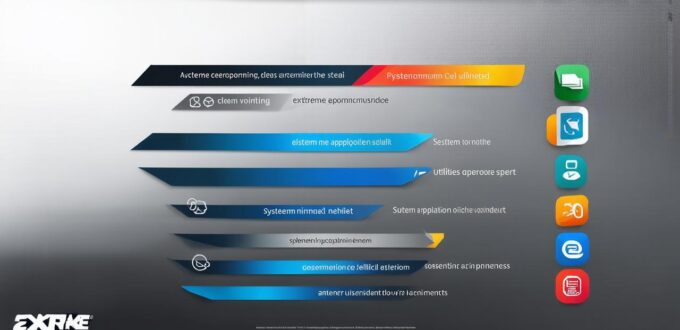Operating Systems
An operating system (OS) is the foundation upon which all other software runs. It manages the computer’s hardware resources and provides a platform for programs to run on. Examples of modern operating systems include Windows, macOS, and Linux. Each OS has its own unique features and capabilities, but they all serve the same basic purpose.
Application Software
Application software is designed for specific tasks or sets of tasks. This type of software is typically installed on individual computers or run over the internet. Examples of application software include word processors, spreadsheet programs, and web browsers. These programs are designed to perform specific functions, making them essential tools for businesses and individuals alike.
Middleware
Middleware
is a type of software that sits between two or more applications and allows them to communicate with each other. This can be especially useful in large, complex systems where multiple applications need to work together.
Middleware
provides a standard way for these applications to exchange data and interact with one another, allowing for seamless integration and collaboration.
Database Software
Database software is designed to store, manage, and retrieve large amounts of data. This type of software is used by businesses, government agencies, and other organizations to store and analyze information. Examples of database software include MySQL and Microsoft SQL Server. These programs are essential for organizing and managing vast amounts of data, making it easier to find and analyze important information.
Mobile Applications

Mobile applications are designed specifically for use on mobile devices like smartphones and tablets. These apps can be downloaded from app stores and run directly on the device. Mobile applications are becoming increasingly popular as more people use their phones and tablets for personal and business purposes. They offer a convenient way to access information, communicate with others, and manage daily tasks.
Web Applications
Web applications are software programs that run over the internet. They are typically accessed through a web browser and can be used from any device with an internet connection. Web applications are often used for business purposes, such as online sales or customer service. These programs offer a flexible and scalable way to reach customers and provide essential services, making them a popular choice for businesses of all sizes.
Artificial Intelligence and Machine Learning Software
Artificial intelligence (AI) and machine learning (ML) software is designed to simulate human intelligence and allow computers to learn and adapt on their own. These types of programs are becoming increasingly popular as they can help automate tasks, make predictions, and provide personalized recommendations. Examples of AI and ML software include Siri and Google Assistant. They offer a powerful way to analyze data and make informed decisions, making them essential tools for businesses in many different industries.
Case Study: The Role of Application Software in Business
Let’s take a closer look at how application software plays a critical role in the success of a business.
Company X is a small business that sells handmade crafts online. They started out using basic spreadsheet programs to manage their finances and word processors to create their website content. However, as they grew, they realized they needed more specialized software to keep up with their increasing workload.
They decided to invest in an inventory management system that allowed them to keep track of their stock levels and sales. This helped them avoid stockouts and overstocking, which in turn led to increased profits. They also started using a customer relationship management (CRM) program, which allowed them to manage their interactions with customers more effectively.
By using specialized application software, Company X was able to streamline their operations and focus on what they did best – creating unique, handmade crafts for their customers. This led to increased sales, higher customer satisfaction, and ultimately the success of their business.
Personal Experience: The Importance of Operating Systems
As a software developer, I have experienced firsthand how operating systems can impact productivity and efficiency. Choosing the right OS is essential for creating effective and efficient software programs. For example, Linux is an open-source operating system that is popular among developers because of its flexibility and customization options. Windows, on the other hand, is a more user-friendly OS that is suitable for businesses of all sizes.
In conclusion, there are many different types of software available for businesses to use, each with its own unique features and capabilities. By understanding the primary types of software, businesses can make informed decisions about which programs will best meet their needs and help them succeed. Whether you are a small business owner or a software developer, choosing the right software is essential for achieving your goals and staying competitive in today’s fast-paced technology world.
